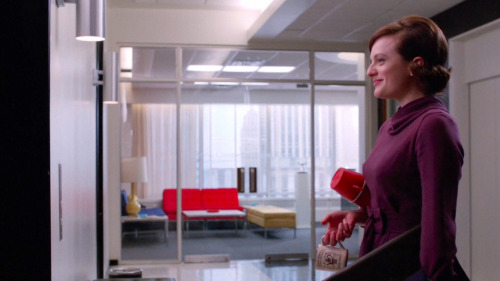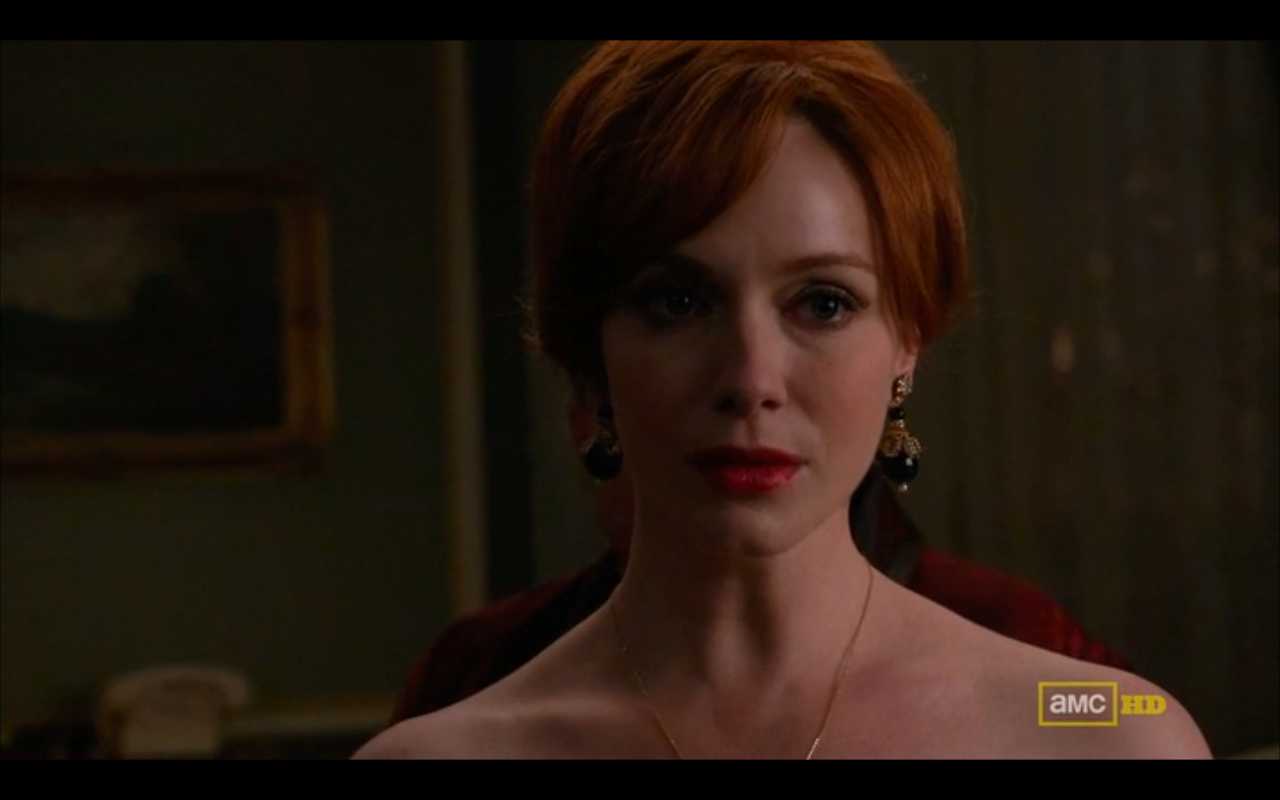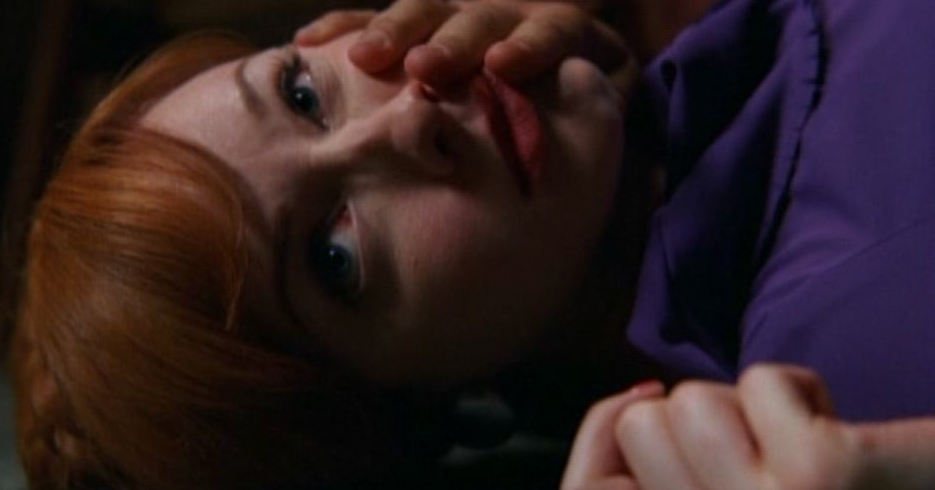The title ‘The Other Woman’ is of course a reference to the angle the SCDP creatives originally take when brainstorming for their Jaguar pitch: positioning the E-Type as a beautiful, exciting mistress. However, it also brings to mind the inevitable comparisons the episode raises between Peggy and Joan. Following up on the diverging paths the two women have taken throughout the series, ‘The Other Woman’ focuses on sudden, unexpected progressions in their respective careers, and—more to the point—how those progressions are achieved.
Peggy, after nearly an entire season of being passed over, under-appreciated, and now downright disrespected by Don, is once again encouraged by someone else to do something about it. Freddy Rumsen, her first champion all the way back in the ‘Basket of Kisses’ days, offers her a solution. Peggy wants to seek offers from other firms to metaphorically throw in Don’s face after he literally throws money in hers in an unwarranted fit of temper. Freddy feels that Peggy is being held back at SCDP and can really ‘shine elsewhere’, so suggests she takes a better offer to advance her career rather than just using one to prove her worth to Don. Putting in a good word for her with Don’s rival Teddy Chaough, Freddy enables Peggy to take a meeting but it is her own work that gets her noticed. Impressed by her portfolio, Chaough not only wants to hire Peggy but ups her initial salary request to ensure she doesn’t go elsewhere. Yes, the competitive Chaough probably delights in hiring Peggy away from Don, but surely he wouldn’t want her if he didn’t think she could do the job. While she often needs someone else to spell out her path for her, Peggy achieves career progressions on the merit of her own work.
When she resigns, it is a highly emotional scene; Don, although he churlishly tries to take credit for her successes, fully realizes what he and the firm are losing. However, Peggy’s wait for the elevator out in the lobby is quietly victorious; not only does she have the backbone to leave as planned in spite of SCDP’s success on the Jaguar account, but the opening strains of The Kinks’ ‘You Really Got Me’ as she awaits her final exit from the Time-Life building signal her excitement and—hopefully—her future success elsewhere. The elevator may be going down, but Peggy certainly looks like she’s going up.
But then there is Joan: Joan who has long prized her body above her mind; Joan whose mother raised her to be admired; Joan, the ‘dynamite redhead… built like a B52’, as she is described by middle-aged, overweight Herb Rennet, the head of the Dealer’s Association, who asks Pete and Ken to let him sleep with Joan in exchange for the possibility of his vote for SCDP in the Jaguar pitch. In ‘The Other Woman’, Joan is made partner with a 5% stake in the company, but she achieves this by bargaining Rennet’s use of her body in exchange for it. Initially outraged by Pete’s unsubtle suggestion that she comply with Herb’s wishes, over the course of the episode she is tempted into acquiescing. Seeing a way to cement her standing at the agency for life, she eventually takes it. What are we to make of this development in terms of my previous article in Invisible Culture about Mad Men using the interplay of Peggy and Joan’s trials and triumphs to construct a feminist text?
In early episodes, audience members were encouraged to admire Joan for using her body to get what she wanted. In stark contrast, her scene with Herb is on a par with—if not worse than—the rape scene in season two that marked a change in Mad Men ’s representation of Joan. With Herb, as she turns to camera just before submitting to the unwanted sexual encounter, the parallels with the shot of her on the floor of Don’s office during her rape are strong. Although Joan stops Herb’s hand as he grabs at her, turning away to begin their encounter on her own terms, her control over the situation is superficial at best. Yet Mad Men provides motivation for Joan’s actions. In season two, her continued relationship with and eventual marriage to her rapist were shockingly submissive actions for the character, but understandable primarily in relation to her views of marriage as a woman’s ultimate goal. Since she threw Greg out and he served her with divorce papers, we know their union is finished. It’s unclear how much he might be supporting her financially, but a 5% stake in the business is obviously going to be highly beneficial for her. Her financial future far more secure now, she is also savvy enough to demand she be made a voting partner, no longer confined to just chairing and taking minutes of the meetings. It is not impossible to see why Joan would—however reluctantly—agree to the plan.
The scene where she visits and sleeps with Herb is intercut with Don’s Jaguar pitch about the desire to ‘own’ beautiful things, underlining the many parallels at play. Don speaks about the way beautiful objects speed by, just out of reach, asking ‘What price would we pay? What behavior would we forgive?’ in order to possess them. For Pete and—to varying extents—Bert, Roger and Lane, the beautiful thing is the Jaguar account, and they are willing to sacrifice a 5% stake to Joan and reframe prostitution as ‘business at a very high level’ in order to possess it. We also know what (or, rather, who) Herb finds beautiful and what he has forgiven in himself in order to gain access to it. The object of Joan’s desire seems to be real power within SCDP, and we are shown what she is willing to pay for that. Yet as I watched her compromise herself in exchange for her partnership I was reminded of Don’s words to her in her apartment as he informs her that he is against the plan and tells her ‘It’s not worth it.’ Of course, it is soon revealed, Don’s visit comes too late; Joan has already returned from Herb’s hotel room. Yet had Don arrived earlier, would she have gone anyway?
A natural development for a woman who has always used her body to gain power in the workplace, Joan trades what she knows she possesses in abundance in exchange for (finally, quite real) power. In a way, she has now outplayed Peggy, as there are many years of hard work ahead of the latter before she will be anywhere near being made partner, wherever she ends up. When Don, desperate to keep Peggy around, tells her to name the necessary salary, she calmly stands her ground and assures him ‘There’s no number’ with which he can buy her now. Unlike Joan with Herb, Peggy maintains control and dignity, yet has taken only a tiny step, and an uncertain one. Bearing this in mind, perhaps Joan takes the opportunity to become partner because she feels this will be her only chance. Sadly, previous episodes have offered a glimpse of another way for her, in which her obvious business acumen is justly rewarded on its own terms. Season four and the preceding episodes of season five seemed to be moving Joan away from her earlier Helen Gurley Brown model of career manipulation; in spite of her waning erotic power she maintained and even gained power within the agency. It took two women to do her job while she was on maternity leave, and the SCDP office staff were eager for her return. Would her brilliance alone have seen her through to being made partner? Now we will never know. The look on Don’s face as Joan is called into her first informal partners’ meeting in Roger’s office says it all; her success will always be tainted with the knowledge of how it was achieved. She may be holding her head up high, defiantly acknowledging her actions to her horrified colleague and friend, but the truth will always be there, festering underneath. And it is not just Don who ought to be horrified; in all good conscience, after seeing the sadness in Joan’s eyes as she turns to allow Herb to unzip her dress, surely viewers cannot celebrate her career progression without serious qualification. Joan is now partner: quite a prize. But—we must ask ourselves—at what price?
– Fiona Cox
Fiona Cox is working towards a PhD in Film and Television Studies at the University of Warwick, UK. Her research concerns the costuming of lesbian identity in contemporary visual cultures, and features a section on Carol and Joyce in Mad Men.





